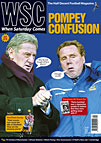 Ron Greenwood passed away leaving behind him a distinguished career. Darron Kirkby remembers the former England manager
Ron Greenwood passed away leaving behind him a distinguished career. Darron Kirkby remembers the former England manager
England’s 6-3 defeat by Hungary in 1953, their first by an overseas side at Wembley, must have been a humiliating experience. But, for one fascinated spectator, the match crystallised a view of the game that was to manifest itself in English football’s most glorious afternoon.
When Ron Greenwood was appointed West Ham manager in April 1961, he was still eulogising about the Mighty Magyars’ vision, movement and control. As a football purist, Greenwood cared more about the finer points of the game than winning for winning’s sake. Football was a battle of wits, rather than brawn. Young players were sent on training courses to understand the theory of the game. The emphasis was on working with the ball and self-expression. Never once was a Greenwood side told to keep it tight and play for a draw.
If one of his protégés, Martin Peters, was ten years ahead of his time as a player, Greenwood was just as advanced as a manager. Harry Redknapp recalls leaving the coaches at Lilleshall dumbfounded when, during an England youth practice match, he asked a full-back to go on the overlap, as Greenwood would teach. They had never heard of such a tactic. In 1964, he tried to sign an Israeli, but was refused permission by the Football League. Billy Bonds said that when he signed from Charlton, Greenwood talked about aspects that he had never considered, such as diversionary running and the creation and use of space.
Greenwood stressed that football was a simple game and never used a blackboard. Every move was illustrated during training, initially at walking pace. He was so keen to educate that sometimes he had to be dragged off the field.
Greenwood felt the best way to complete his players’ education was to test them against foreign sides. At the end of his first season in charge, he took the team on a trip to Ghana. In 1963, West Ham won the International Soccer League tournament in New York, which featured 14 teams from six countries. Greenwood said it was the start of a new era for the club. He couldn’t have been more right.
After clinching the FA Youth Cup in 1963, West Ham won their first FA Cup a year later. In 1965, they beat TSV Munich 1860 2-0 to clinch the Cup-Winners Cup, with nine players who had progressed through the youth team. It was not only the result that made it the greatest night in club history. Greenwood said: “It was the way we won. For me, it was fulfilment.”
The following season, West Ham reached the semi-final of the ECWC, the final of the League Cup and won the World Cup. From the near-post headers Geoff Hurst scored against Argentina and West Germany (crosses from Peters and Bobby Moore, respectively, and aping a Hungarian tactic) to the clinching fourth goal in the final, so much of that success was made in E13.
The crucial flaw in Greenwood’s make-up was his man-management. Moore claimed that he never received a “well done” from his bosses. Many regarded Greenwood as cold and aloof. Even his integrity caused him to miss out on signing Gordon Banks in 1967 because he already had a gentlemen’s agreement to buy Bobby Ferguson from Kilmarnock.
Also, while Greenwood’s ideas were perfect in theory, West Ham lacked the players to implement them and they could literally be kicked off the park. Moore once said: “I couldn’t deny his brilliance. The man is the encyclopedia of football. He sees things that were beyond the comprehension of many coaches and players. But he talked about the game at such a high level that sometimes it went over the head of the average player.” West Ham finished in the top ten only four times in Greenwood’s 13 years in charge and lost cup matches to Hereford and Mansfield.
When Greenwood replaced Don Revie as England manager in 1977, it was widely held that it was five years too late, as such a devoted student of the world game should have replaced Sir Alf Ramsey. After three years as general manager at West Ham, his new role reignited Greenwood’s passion and he restored wingers and used 4-2-4. But the media had wanted Brian Clough as manager and Greenwood always had his work cut out.
His use of Glenn Hoddle was criticised and, despite only four defeats in 26 competitive matches, first losses to Switzerland and Norway didn’t help. After England went out of the 1982 World Cup without losing, having played all but 27 minutes without Trevor Brooking and Kevin Keegan, Greenwood quit.
His legacy is far reaching. Managers such as Ken Brown, John Bond, John Lyall and Redknapp all graduated from his academy, while West Ham men such as Tony Carr, whom Greenwood once coached, are still behind one of the richest production lines in English football: Lampard, Cole, Ferdinand. His desire for continuity at England level – Bobby Robson, Terry Venables and Howard Wilkinson were all part of his team – is back in vogue.
He might not have enjoyed the same affection from players and fans as Sir Matt Busby and Bill Shankly, but his integrity (never has an autobiography, Yours Sincerely, been more aptly named), knowledge and dedication invariably commanded respect. It was a shame that the powers-that-be showed a lack of respect by not holding a minute’s silence at every league ground in Greenwood’s honour.
From WSC 230 April 2006. What was happening this month